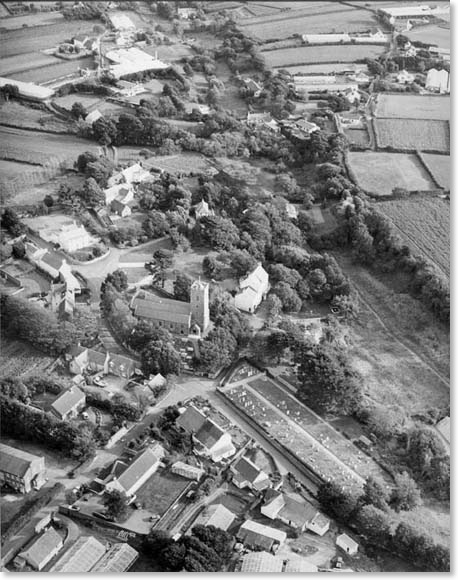
Les Buttes, St Pierre du
Bois - La Salle Paroissiale is centre left
Today the most important fact that
differentiates a Guernsey parish from a UK parish is that
in Guernsey the parish assemblies (or parish meetings as
they are more often called) decide on the sums to be raised
through parochial taxation to finance both secular and
ecclesiastical expenditure. A parish meeting is analogous
to a sitting of the States as only a parish meeting can
approve budgets and accounts. In this analogy a Douzaine's
role is similar to that of a States' Department in that it
makes secular budget proposals to the parish meeting but
acceptance of those proposals is entirely dependent upon
the meeting's approval.
As the sums raised through parochial taxation have declined
relative to those raised by the States, in particular since
the introduction of income tax in the 1920s, so the
importance of the parish meetings has declined. If the
increase in parochial expenditure had kept pace with that
of States expenditure over the last hundred years each
parish would be raising an average of £7,500,000 annually
through its rates and doubtless attendance at parish
meetings would be higher than it is at present.
The Parochial Taxation Law makes no reference to Douzaines.
The current procedures whereby the Douzaines compile the
proposed budget for the forthcoming year is customary. The
law requires only that the Constables publish proposed
expenditure in the Gazette Officielle (the Publication)
prior to the parish meeting for debate at that meeting. All
that prevents a parishioner from asking the Constables to
include a proposal in the Publication is that such a
request is not customary.
Until the 19th century parish meetings were held early in
the morning on church property, outdoors if the weather was
fine, and they were chaired by the rector. In 1902 the
States decided to formally separate parish meetings into
two parts; the first part, chaired by the rector, to
consider ecclesiastical matters presented by the
churchwardens and the second part, chaired by the Dean of
the Douzaine, to consider secular matters. This change was
of fundamental importance, it acknowledged the spread of
literacy beyond the clergy, the non-Anglican denominations
and the increasing secularisation of society.
The right to raise money for a wide variety of purposes, as
enshrined in the Parochial Taxation Law and as exercised at
parish meetings, lies at the heart of our parishes'
autonomy.